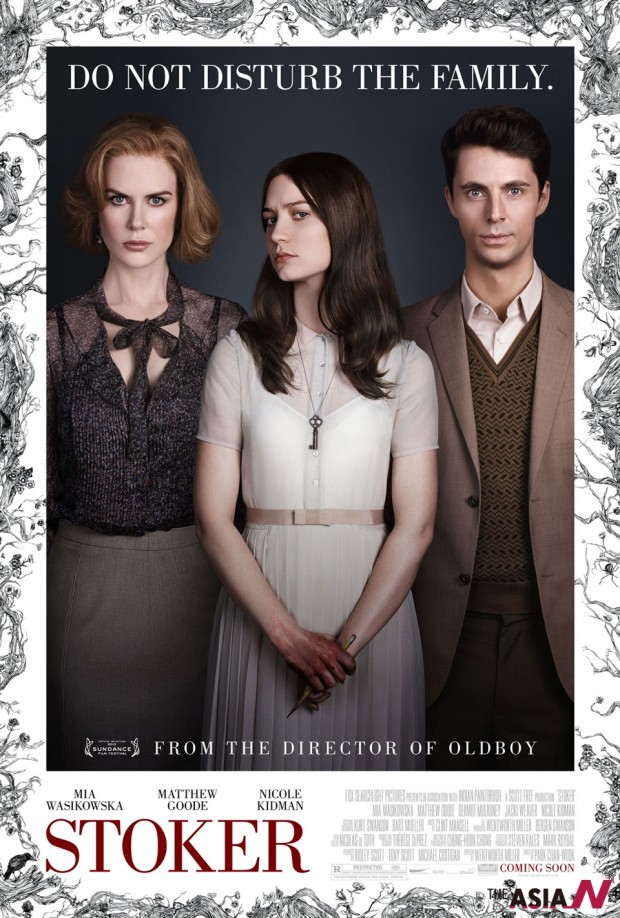
Mastery of silence and subtle violence
A review of Stoker directed by Park Chan-wook
If we take a look at the world cinema, each country’s has a different trait that defines the industry. It is a whole different set of aesthetics which appeal to the local audience, and often times, to a global audience as well. A popular example is Indian film industry, Bollywood.
Bollywood films are appreciated all over the world for their larger-than-life narratives, elaborate sets and distinct, catchy music while Iranian cinema is known for their gritty true-to-reality dramas, at times compared with Italian Neo-realism. Throughout the film history, a number of film movements have defined, challenged and revolutionized the cinema, not just their own but in the long run, have made an impact on other film industries as well. South Korean cinema is not far behind. In fact, it may be called a dark horse in the never-ending marathon of cinema.
South Korean films have developed a unique identity throughout the years. Some filmmakers such as Park Chan-wook and Kim Ki-duk have garnered international acclaim as well. They have produced some remarkable films that have even garnered attention in Hollywood. Films like Il Mare (2000), My Sassy Girl (2001), and A Tale of Two Sisters (2003) have been remade in Hollywood. An American remake of Oldboy (2003), which is said to be one of the best Asian films ever made, is also slated to release soon.
Recently, the increase of the hype of Korean cinema led me to watch Stoker, which was released earlier this year. It is directed by Park Chan-wook, who’s previously known for Joint Security Area (2000), Thirst (2009) and the Vengeance trilogy (Sympathy for Mr. Vengeance, Oldboy and Sympathy for Lady Vengeance).
Stoker is Park’s first English language film. It is influenced by Alfred Hitchcock’s Shadow of a Doubt (1943) and somewhat Bram Stoker’s Dracula. The story revolves around India (played by Mia Wasikowska), 18, whose uncle ‘Charlie’ (played by Matthew Goode) appears on her father’s funeral.
Little did she know about her uncle, and while she struggles to cope with her father’s death, her mother Evelyn seems to be attracted towards Uncle Charlie.
The film shows the complex relationships between the mother, daughter and uncle. Park Chan-wook is known for brutal subject matter and films full of violence. In Stoker, he retains that element which he has become known for, but in a quite subtle and articulate manner.
Although a Hollywood film, Park retains his auteur vision and tried not to appeal to the conventions. He was quoted as saying: “When I say that I am going to do an American film, I didn’t want to suddenly go off into a completely different world that which bears no relation to the style of filmmaking that I’m used to.” (Templin, J. A Q&A with Stoker Director Park Chan-wook)
The film tackles themes like love, puberty and sexual awakening draped inpsychological instability and calculated chaos. It contains references to Alfred Hitchcock’s film Shadow of a Doubt such as the name ‘Uncle Charlie’ which was also the name of the character, played by Joseph Cotten in Hitchcock’s film, and also the use of train sounds in the film, which were used as sexual euphemism.
Despite Hitchcock’s influences, Park didn’t merely want to follow the Master of Suspense. Retaining his vision, he did not try to make a film that belonged to any particular region. Stoker exists in a dimension that is not part of a geographic location but in mere imagination. The Korean filmmaker makes sure to keep it as mysterious and eerie as possible, through the use of silence and subtle violence that might not come off as clearly brutal at first but creeps under the viewer’s skin when he least expects it. The beautiful score by American composer Clint Mansell and the strangely poetic cinematography add to the unnerving nature as well.
Overall, with its eerie atmosphere and setting, mysterious characters with great character arches (specifically India Stoker’s), an interesting screenplay and Park Chan-wook’s unique direction, Stoker gives it all to create a beautiful cinematic experience.
Stoker proves to be a memorable English language debut by Park Chan-wook. Park proves that Korean cinema has come a long way. The filmmakers are achieving global recognition, proving to be innovators of contemporary cinema. South Korea seems to be among the front runners of Asian Cinema and prepares to grow its magic further.










